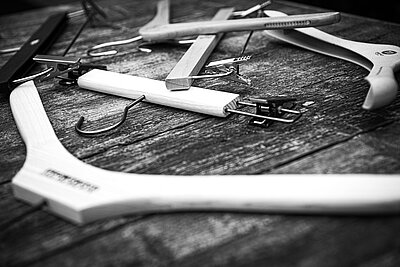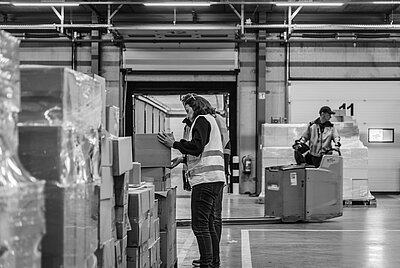The pulp shortage is one of the less predictable side-effects of quarantine. With many consumers sheltering or too scared to shop in person, the uptick in online shopping means demand for packaging is outstripping supply.
In the US, there’s a similar shortage of aluminium caused by increased consumption of tinned alcohol and canned food. Likewise, the sudden interest in baking sourdough bread during the first and subsequent lockdowns was caused less by consumers finding themselves with time to fill, and more by blockages in the yeast supply chain, caused by manufacturers running out of the paper sachets in which they are shipped.
Across food and drink, then, what consumers may have perceived as scarcity of product was, often, a lack of packaging materials.
No obvious answer
Even if there were sufficient raw materials, solving problems like these wouldn’t be as simple as ordering more boxes and waiting for them to arrive. In many cases, production lines are set up to produce B2B packaging, optimised for take-away businesses, or transporting larger products than consumers would typically buy, like office-sized toilet rolls and commercial-sized bags of ground coffee. Many of the businesses that would have bought these products are currently paused or closed, and repurposing such lines would, at the very least, require a degree of product redesign. At worst, they may require retooling. Neither of these options is quick or cheap.
The pulp shortage is a very visible lesson – for both consumers and suppliers – of the importance not only of products to feed a busy supply chain, but the supplementary elements essential to its smooth operation. And it is not the only one.
With several coronavirus vaccines approved and already in use, the odds of returning to some semblance of normality no longer seem so long – but the time this takes will be dependent, to a large degree, on the efficiency of the pharmaceutical supply chain.
Most vaccines require multiple jabs to be fully effective, so chemists will need to ship 15 billion doses worldwide. This places heavy demands not only on biomedical production lines, but on the glass manufacturers producing the vials in which they are shipped, suppliers of the packaging required to protect those vials, and the coordination of the fleets of refrigerated vehicles required to take the product to its point of distribution. The logistical considerations are unlikely to be any less complex than the development of the vaccines themselves.
On a more personal level, doctors are finding the ultimate step in Covid vaccine delivery hampered not so much by a shortage of packaging, but a shortage of needles. The vials in which the Pfizer/BioNTech-developed shot are delivered require an unusually long and thin needle for most efficient extraction and delivery. In France, this is supplied by the French health authority, but the right needles aren’t always getting to the right place. As a result, some doctors find themselves in the frustrating position of having sufficient vaccine for their patients, but no means of administering it.
Beyond coronavirus
Packaging considerations affect not only individual products or the companies that produce them. As we are now seeing, they can impact an entire nation state.
Since the end of the Brexit transition period on 31 December 2020, UK suppliers need to make sure any pallets they use to ship product to Europe comply with ISPM15 phytosanitary standards. But, a shortage of pallets – and of the kilns required to bake them at a minimum 56 degrees Celsius for 30 minutes to kill any pests they may be carrying – threaten to disrupt UK exports across all products that require pallets for their transport and distribution .
A temporary easement, negotiated in November 2020, allows members of the UK Wood Packaging Material Marking Programme to repair compliant pallets with non-compliant material, but it expires at the end of July 2021. At that point, unless sufficient quantities of regulation palettes have been sourced, it might not be checks on products, but on the packaging surrounding them that causes delays or turn-backs at the border.
Remaining a smooth operator
Brexit may not affect everyone, but the Coronavirus pandemic has done – and will continue to do so. It has reshaped every commercial market and, in the process, changed customers’ expectations. While some have complained about the switch from paper to plastic egg packaging, many consumers are more interested in what’s inside the box rather than how it’s delivered and, if their usual supplier can’t produce the goods, they will look elsewhere. As McKinsey has found, convenience is a more important factor than price, when consumers are choosing where to shop.
The last 12 months have been an indiscriminate test for global supply chains, affecting all markets and a broad range of product types. By and large, they have proved robust. Short-term shortages have been overcome because manufacturers and their logistics suppliers have worked around the causes and adapted their offering to fit.
With the future still uncertain, the lessons learned over the last 12 months will likely inform the year ahead – and, in that respect, there is much to be optimistic about.
What we’re doing at Worldpack
Worldpack has extremely strong relationships with its customers but with COVID, we upped our game and our Service with Guts mission, acting quickly to offer rapid solutions to customers to meet their immediate needs. This has been made possible by the continued investment in our assured and accredited supply chain. We are in regular contact with our customers and believe ongoing, transparent communication and really understanding future business aims as well as any current challenges is crucial for us to deliver (no pun intended!)
If you want to avoid sleepless nights, knowing you can trust Worldpack as a solid lynchpin in your supply chain, speak to us on +31(0) 88 494 20 80 or email online@worldpack.eu.


